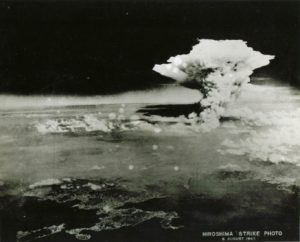This month marks the 75h anniversary of the U.S. atomic bombings of Hiroshima and Nagasaki. While proponents of the bombings have long justified them on the basis that they shortened World War II, the fact is that they were war crimes. The only reason why President Truman and the pilots who dropped the bombs were not prosecuted as war criminals is because the United States ended up winning the war.
It has long been pointed out that Japan had expressed a willingness to surrender. The only condition was that the Japanese emperor not be abused or executed.
President Truman refused to agree to that condition. Like his predecessor Franklin Roosevelt, Truman demanded “unconditional surrender.”
That was why Japan continued fighting. Japanese officials naturally assumed that U.S. officials were going to do some very bad things to their emperor, including torture and execution. In the minds of Japanese officials, why else would the United States not be willing to agree to that one condition, especially given that it would have meant the end of the war?
The dark irony is that Truman ended up accepting the condition anyway, only after he pulverized the people in Hiroshima and Nagasaki with nuclear bombs.
In an excellent op-ed in the Los Angeles Times today entitled “U.S. Leaders Knew We Didn’t Have to Drop Atomic Bombs on Japan to Win the War. We Did It Anyway” the authors point out:
Seven of the United States’ eight five-star Army and Navy officers in 1945 agreed with the Navy’s vitriolic assessment. Generals Dwight Eisenhower, Douglas MacArthur and Henry “Hap” Arnold and Admirals William Leahy, Chester Nimitz, Ernest King, and William Halsey are on record stating that the atomic bombs were either militarily unnecessary, morally reprehensible, or both.
Keep in mind that there is nothing in the principles of warfare that required Truman and Roosevelt to demand the unconditional surrender of Japan (or Germany). Wars can be — and often are — ended with terms of surrender. Both presidents were willing to sacrifice countless people on both sides of the conflict to attain their demand for unconditional surrender.
But Truman’s unconditional surrender demand is not why his action constituted a war crime. This bombings constituted war crimes because they targeted non-combatants, including children, women, and seniors with death as a way to bring about an unconditional surrender of the Japanese government.
It has long been considered a rule of warfare that armies fight armies in war. They don’t target non-combatants. The intentional killing of non-combatants is considered a war crime.
A good example of this principle involved the case of Lt. William Calley in the Vietnam War. Calley and his men shot and killed numerous non-combatants in a South Vietnamese village. The victims included women and children.
The U.S military prosecuted Calley as a war criminal — and rightly so. While the deaths of non-combatants oftentimes occurs incidentally to wartime operations, it is a war crime to specifically target them for death.
Truman justified his action by arguing that the bombings shortened the war and, therefore, saved the lives of thousands of American soldiers and Japanese people if an invasion had become necessary. It is a justification that has been repeated ever since by proponents of the bombings.
There are two big problems with that justification, however.
First, an invasion would not have been necessary. All that Truman had to do was to accept Japan’s only condition for surrender, and that would have meant the end of the war, without the deaths that would have come with an invasion and that did come with the bombings of Hiroshima and Nagasaki.
More important, the fact that lives of American soldiers would have been saved is not a moral or legal justification for targeting non-combatants. If Calley had maintained at his trial that his actions were intended to shorten the Vietnam War, his defense would have been rejected. He would have still be convicted for war crimes.
Soldiers die in war. That is the nature of war. To kill women, children, and seniors in the hopes of saving the lives of soldiers by shortening the war is not only a war crime, it is also an act of extreme cowardice. If an invasion of Japan would have become necessary to win the war, thereby resulting in the deaths of thousands of U.S. soldiers, then that’s just the way that war works.
It’s also worth pointing out that Japan never had any intention of invading and conquering the United States. The only reason that Japan bombed Pearl Harbor was in the hope of knocking out the U.S. Pacific fleet, not as a prelude to invading Hawaii or the continental United States but simply to prevent the U.S. from interfering with Japan’s efforts to secure oil in the Dutch East Indies.
And why was Japan so desperate for oil as to initiate war against the United States? Because President Franklin Roosevelt had imposed a highly effective oil embargo on Japan as a way to maneuver the Japanese into attacking the United States.
FDR’s plan, of course, succeeded, which ended up costing the lives of hundreds of thousands of American soldiers and millions of Japanese citizens, including those at Hiroshima and Nagasaki.




